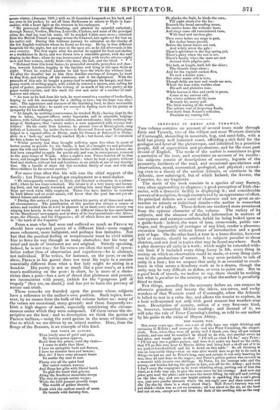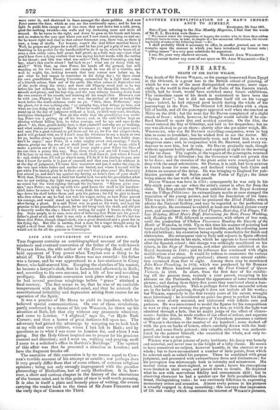SKETCHES IN ERRIS AND TYRAWLY.
THIS volume contains an account of several tours made through Erris and Tyrawly, two of the wildest and most Western districts of Connaught, abounding in mountain, bog, and sand-hills, with a bold but pretty well indented coast, affording a rich field for the geologist and lover of the picturesque, and inhabited by a primitive people, full of superstition and goodnature, and for the most part devoid of English. The mode of the author is sometimes to give a narrative of his tour, and sometimes an account of its results: his subjects consist of descriptions of scenery, legends of the peasantry, incidents of the road, and occasional speculations and observations, moral, economical, geological, and physical ; extend- ing even to a theory of the ancient Atlantis, or continent in the Atlantic, now submerged, but of which Ireland, the Azores, the
Canaries, &c. are fragments. The merit of the book consists in a species of easy fluency, very often approaching to elegance; a good perception of Irish cha- racter, with a dramatic facility in displaying it ; and considerable powers of description, though encumbered by an appearance of effort. Its principal defects are a want of closeness and too great an at-
tention to minute or individual details—the author is somewhat too much of a talker. These defects are rendered more prominent from the epicene character of the volume. The variety of its subjects, and the absence of detailed information in matters of conveyance and creature-comforts, forbid its being looked upon as a guide-book : indeed, the want of inns, cross-roads, public car- riages, and frequently of carriages of any kind, render a pleasure- excursion impossible without letters of introduction and a good pair of legs. On the other hand, a tour in a home district, however wild or remote, should be confined to subjects peculiar to those districts, and not deal in topics that may be found anywhere. Such a plan destroys all unity in a work ; which might be extended with- out limit if it included every thing funny in life, every thing in society on which an observation could be made, or every thing curi- ous in the productions of nature. It may seem pedantic to talk of unity in a tour ; but we suspect that unity is as essential to excel- lence in what seems a desultory work as in a drama, though the unity may be very difficult to define, or even to point out. But in a good book of travels, we incline to say, there should be nothing but what is peculiar to the country, or what the author is peculiarly fitted to treat.
Few things, according to the accounts before us, can surpass in alternate grandeur and beauty the inlets, sea-caves, and rocky wonders of that Western coast of Connaught, when the Atlantic is lulled to rest in a calm day, and allows the tourist to explore, in a boat well-manned not only with good seamen but weather-wise men. Description of scenery, unless of a very first-rate kind, is, however, somewhat lifeless reading ; and instead of it, we will take the tale of Peter Cumming's daring, as told to our author by his guide in the ruins of Moyne Abbey.
THE WAGER WON.
Not many years ago, there was a set of jolly boys one night drinking and
carousing in Kaiak ; and amongst the rest was Peter Cumming, the chapel- clerk. Now, when they were all pretty well I thank you, they all got valiant intirely, and one said he wouldn't be afeard to do this, and another swore he had done, and would again do that. " I'll tell ye what I'll do," says Peter ; " I'll bet any one a golden guinea, and here it is under my hand on the table, that I'll go this very hour to Moyne Abbey and bring here a skull out of it in my pocket-handkerchief, and lay it down on this table." So all thinking it was an impossible thing—that no man alive would dare to go for to do such a thing—to put an end to Peter's brag, sure and certain it was only boasting he was, they all said done to the wager ; and Peter's golden guinea was covered in a moment with twenty-one shillings. So Peter, for his courage sake and the money, and besides having the spirits in him, sets off for the Abbey; and troth I don t envy the scapegrace as he went whistling along, putting out of him the wind, as a body may say, to give the more room for his courage. And now my joker gets near the place ; and he sees the tower lifting its tall self and cutting on the blue sky, and one star bright entirely is sparkling like a cat's green eye,'ust over yonder pinnacle where the sea-eagle now and then comes and sits by-the-by there is a story about that). Still Peter's bravery was not put a k—there was as yet no occasion; all was silent in the air, on the land and out at sea, except now and then the dash of the swelling tide as the easy wave came in, and shattered in foam amongst the shore-pebbles. And now Peter passes the door, which as you see lies continually open ; and he has no light to guide him except one or two stars that sent down but a cold, green, good-for-nothing twinkle—the walls and ivy darkening more and more all around. So he turns to the right, and down he goes on his hands and knees, and he makes to the very spot where you and I now stand, creeping on and on; for he knew right well that in that corner forenenst you, there was, as there is now, a heap of skulls. Yer honour, wasn't the mad fellow morthal brave ? Well, he gropes and gropes for a skull; and he has just got a grip of one, and is fumbling in his pocket forpe the handkerchief to tie it up in, when he hears all at once a slow sickly voice, half groan half growl, as a body may say—just what you'd hear from a dying crathur that was saying his last words, with the rattles in his throat ; and this was what was said—" Och, Peter Cumming, you bad boy, what's this you're about ? bad luck to ye ! what are ye doing with my skull ?" With that, up rises Peter, his hands off the ground, but still standing on his two knees; and sure enough he was all of a trimble, and well lie might, for, looking towards that very corner now before us, he saw what he bad reason to remimber to his dying day ; for there stood his own grandfather, Phaarig Cumming, surrounded by a light that came, of a blueish colour, from out of the earth, like what comes in September out of the reeds along the river ; and there old Phaarig stood just as he was before his last sickness, in his frieze coteen and his sheepskin breeches, all smooth and greasy, and his bay-wig, and the very tobaccy running down from the two corners of his mouth, and staining all his rough chin. Heaven's rest be with you, Phaarig but there ye wor, the pictbur of what ye looked the week before the death-sickness came on ye. " Och, then, Pethereen," says the ghost, for it was nothing else, " ye unlucky boy, what brings ye here, and what are you doing with my skull ? What for would ye have your grandfather stand up at the day of judgment without a head, ye divil-may-care, drunken, irreligious blackguard ?" Now all this while that the grandfiither was scold- ing, Peter was a getting up off his knees ; and, as the ould fellow kept on abusing without killing him, he takes courage, and he ups and says to the ghost, " Ab, then, grand-daddy dear, is that yourself? and why are ye walking, and what makes ye unquiet ? Maybe it's masses ye want for yer poor Bowl; and sure I'm a good warrant to get them sed for ye, for I'm the chapel-clerk, and it will go hard with me if I don't coax his riverance to say a dozen or two for ye, besides always keeping you in his intintions. And now daddy dear, don't be angry," says Peter, in a voice mighty sweet and coaxing; " don't, alanna, grudge me the use of yer skull just for one bit of an hour, while I make a guinea out of it ; sure it's not every night a poor fellow the likes of me can turn a penny this way. Stay, then, where you are till I come back ; I'll be here in no time, and I'll lave the skull, God bless it, just where I found it : and, daddy dear, I'll tell ye what's more, I'll do if it be plasing to you, now that I know for sartin it is part of yourself, and that you can't do without it at the day of judgment, I'll come here tomorrow and put it under the clay, in the very spot where father and mother are buried, and where I myself will be put when I'm buried, glory be to God; and won't that plase you ? Do, Heaven's rest attend ye, and don't say against my having an hour's loan of your skull." With that, Pethereen cast a fond but fearful look towards his grandfather ?but now he saw nothing, the light was gone, nothing was to be seen but darkness, no sound but the wind sighing through the ivy-leaves. " Silence gives mu- tant," says Peter ; so, tying up with two good knots the skull in his handker- chief, home he comes by the way he went,.finds his company still a drinking, lays down his skull before them, and gets his guinea ; for I'd be glad to know who dare refuse or say he had not won his wager, seeing as how Peter proved his courage, and would stand up before any of them, when he had just been after facing a ghost. It is said Peter was as good as his word, and kept his promise to his grandfather's ghost, for he did bring back the skull, and did put it dacently under the clay ; where it's resting, for aught I know, to this very day. Some people, to be sure, were slow of believing that Peter saw his grand- father's ghost at all, and that it was only a drunkard's boast ; for it's but too throe that Peter, though chapel-clerk, was a great drunkard and a great liar to his dying day. But this is sartain, that a man for a wager brought away by night a skull from this abbey, and brought it back again ; which is what I would not do for all the guineas in Connaught.



























 Previous page
Previous page